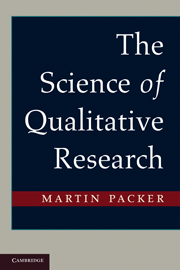Book contents
- Frontmatter
- Contents
- List of Figures and Tables
- List of Boxes
- Acknowledgments
- Introduction
- Part I The Objective Study Of Subjectivity
- Part II Ethnographic Fieldwork – The Focus On Constitution
- Part III Inquiry With An Emancipatory Interest
- 11 Qualitative Research as Critical Inquiry
- 12 Emancipatory Inquiry as Rational Reconstruction
- 13 Social Science as Participant Objectification
- 14 Archaeology, Genealogy, Ethics
- 15 A Historical Ontology of Ourselves
- References
- Name Index
- Subject Index
12 - Emancipatory Inquiry as Rational Reconstruction
- Frontmatter
- Contents
- List of Figures and Tables
- List of Boxes
- Acknowledgments
- Introduction
- Part I The Objective Study Of Subjectivity
- Part II Ethnographic Fieldwork – The Focus On Constitution
- Part III Inquiry With An Emancipatory Interest
- 11 Qualitative Research as Critical Inquiry
- 12 Emancipatory Inquiry as Rational Reconstruction
- 13 Social Science as Participant Objectification
- 14 Archaeology, Genealogy, Ethics
- 15 A Historical Ontology of Ourselves
- References
- Name Index
- Subject Index
Summary
Against the intellectual grain of the time, Jurgen Habermas’s grand theorizing defends the claims of reason, universality and normative validity. Among internationally prominent intellectuals on the left today, Habermas is a rarity: he insists the Enlightenment got it mostly right. For decades, he has been at work reconstructing what he sees as the damaged but vital legacy of Enlightenment rationality, rescuing its practical and emancipatory dimensions from the encroachments of technocratic and instrumental reason.
Forbath, 1998, p. 969Jurgen Habermas is one of the most important philosophers today. He was trained in the Frankfurt School, and he continued its reappraisal of Marxism, which by the 1960s he felt seemed to be better at legitimating authoritarian states than critiquing them. Orthodox Marxism – with its determinist reading of Marx’s writings – seemed to be serving an ideological function similar to the one the Frankfurt School had found in positivist science – that of “portraying particular interests and goals as technical necessities” (Mendelson, 1979, p. 46). Four aspects of Habermas’s work are important to us here. The first is his elaboration of Marx’s proposal that knowledge is never neutral and disinterested but is made possible by “knowledge-constitutive interests.” This proposal transformed the image of critical inquiry, showing that it is distinct from both empirical-analytic science and interpretive inquiry but is no less a science for its interest in emancipation. The second is his debate with Gadamer over the requirements for critical inquiry, in which Habermas stated a position that he has never changed: that a researcher needs more than the resources of a member. A frame of reference outside the form of life being investigated is necessary. The third aspect of Habermas’s work is his exploration of psychoanalysis as a model for critical and emancipatory inquiry, a process in which the therapist carries out a depth hermeneutics aided by a theoretical reconstruction of the consequences of childhood trauma. The fourth and final aspect is Habermas’s turn to a collaboration between philosophy and social science to carry out the “rational reconstruction” of human communication and social organization in order to identify their universal underlying norms.
These four aspects center around the crucial question of what kind of special knowledge or stance a researcher needs in order to conduct critical inquiry. Habermas has argued consistently that participation in the practices of a form of life provides insufficient resources to enable a researcher to identify its conditions and inequities. But, at the same time, he doesn’t want to return to Kant’s transcendentalism. His efforts to find a “third path” between absolutism and relativism have made important contributions to our understanding of critical inquiry. His attempts to establish the normative basis for critique – first in cognitive interests, then in a universal theory of communication, and finally in an ethics of discourse – have been enormously influential, even if many consider them not to have been fully successful.
- Type
- Chapter
- Information
- The Science of Qualitative Research , pp. 289 - 315Publisher: Cambridge University PressPrint publication year: 2010



